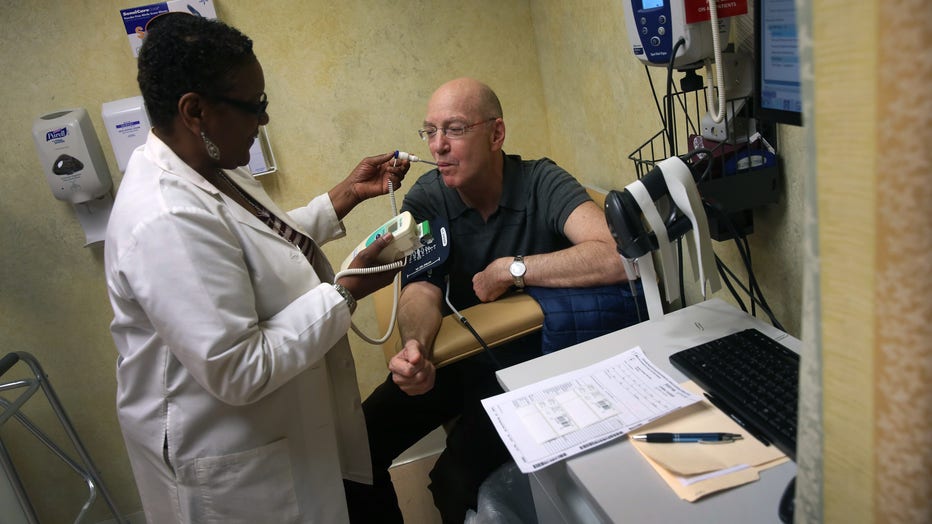How "Trumpcare" could cost 24 million Americans their health insurance


A new report suggests that as many as 24 million Americans could lose their health care under Republicans' plan to repeal Obamacare. (Photo by John Moore/Getty Images)
By Meg Wagner
More uninsured Americans, but cheaper premiums
House Republicans’ plan to repeal and replace Obamacare will nearly double the amount of uninsured Americans over the next decade, according to a new Congressional Budget Office (CBO) report.
If the proposed American Health Care Act (AHCA) — a Republican bill dubbed “Trumpcare” that would overturn the 2010 Affordable Care Act (ACA), known as Obamacare — becomes law, 52 million people would be uninsured in 2026, the nonpartisan report found.
Conversely, if Obamacare remained in place, 28 million Americans would be uninsured by that year — indicating that 24 million people would lose coverage under Trumpcare.
The CBO estimated that 14 million people would immediately lose their insurance in 2018 if Trumpcare passes this year. That’s mostly because the plan would end the individual mandate, which financially penalizes those who go without insurance, and the subsidies for low-and medium-income individuals to purchase insurance in the private market. With those provisions gone, more people will choose to go without coverage.
Average individual premiums are also expected to go up 15-20 percent by 2020. However, those rates will sink after that (eventually being as much as 10 percent cheaper than they would be under Obamacare), since Trumpcare doesn’t require insurance plans to provide as many benefits as Obamacare.
But many more Americans will lose their insurance starting in 2020, because Trumpcare calls for an end to Medicaid expansions implemented under Obamacare. About 11 million low-income Americans gained insurance through the expanded program, but eligibility is expected to be scaled back starting in 2020 under the Republican plan.
Also under Trumpcare, current federal subsidies for individual insurance provided to low- and middle-income Americans to purchase health insurance would be replaced with age-based tax credits. Speaker of the House Paul Ryan and other Republican advocates have insisted that the tax credits will help make health care more affordable to millions of Americans.
The CBO found that getting rid of the subsidies would save the government $673 billion in 2020 — but the tax credit replacements would cost just $361 billion, meaning $312 billion less would be spent on health care payouts.
Overhauling Obamacare
Republicans have promised to repeal Obamacare since the moment it was signed into law in 2010. The election of President Donald Trump, who criticized the ACA on the campaign trail, was seen as a major step toward finally dismantling Obamacare. Just hours after he took office on Jan. 20, he issued an executive order scaling back parts of the ACA, while Republican lawmakers worked on a plan to repeal and replace the law. On March 6, they unveiled their bill.
The proposed law still provides federal funds for health care expenses, but changes the way that money is doled out. Where Obamacare provided large federal subsidies to low- and middle-income Americans to purchase insurance, the new plan gives out age-based tax credits.
More individuals would be eligible for the tax breaks but they’d likely be less generous than the Obamacare subsidies. The credits would max out at $4,000 while the average ACA subsidy is $386 per month in 2017, or about $4,600 per year. In the most extreme case, a 62-year-old making $18,000 a year could pay $20,000 for Trumpcare (that same adult only paid $760 under Obamacare).
Democrats have fiercely condemned the bill, saying it will deny coverageto millions of Americans who became insured thanks to Obamacare. Some conservative Republicans aren’t thrilled with the draft either: Right-wing lawmakers have complained that any federal spending on health care is too much like Obamacare.
One report, many opinions
Reactions to the CBO report were widespread, with diametrically opposed anti-Trumpcare Democrats and pro-Trumpcare Republicans both claiming it supported their positions.
Democratic lawmakers stressed that the analysis proved that millions of Americans will lose their coverage under Trumpcare.
“The CBO’s estimate makes clear that Trumpcare will cause serious harm to millions of American families,” Senate minority leader Chuck Schumer (D-N.Y.) said. “This should be a looming stop sign for the Republicans' repeal effort.”
But the Republicans who already support the new bill were quick to use it to defend the pending legislation.
Speaker of the House Paul Ryan (R-Wis.) and House Budget Committee chairwoman Diane Black (R-Tenn.) both celebrated the 10 percent reduction in premiums and the billions of dollars saved by switching from subsidies to tax credits.
“The American Health Care Act expands choice and freedom while reducing costs and saving taxpayer dollars,” Black said.
But not all Republicans were so thrilled with the news. The Trump administration — which spent part of the weekend questioning the accuracy of the CBO — complained that the analysis only looked at the House bill and did not consider other proposed health care-related measures. The White House said it plans to overhaul health care regulations and introduce legislation to allow insurance companies to sell plans across state lines.
"We disagree strenuously with the report," Health and Human Services Secretary Tom Price said.

